#睿得失这个话痨的长篇大论
Explore tagged Tumblr posts
Text
时鞭自我弊不轻,永宽他人宜为重
//The Intrigue Of Tokinaga Sachiyuki
In the first essay, I speculated about Ahu’az, Furuya Rin (a.k.a. Yako), and Chapter 58.
This one, meanwhile, is a character analysis of Tokinaga. It is the second of my After God essay series. Beware; it's a long read.
You don’t always get one of your favorite characters gone through my Lyndisian treatment, @orange-peel-candy, so I hope this has been a good way for you to pass the time.
Oh, you’re curious about what the Chinese title says?
“Always punishing himself for his profound sins; always forgiving others and prioritizing their virtues.”
It’s my crappy attempt at making a 对联, “duilian poetry.”
There are rules in making one. The same number of characters are used in both lines to form a couplet. There have to be counterpoints in tonal pattern between two lines, such that if they “counter” each other. Words from both lines have to be within the same category, and the meaning of the first line must correspond to the second line's meaning.

I did break one rule though: the first line’s last character has to be of an “oblique” tone while the second line’s last character has to be of a “leveled” tone. In my duilian title, the opposite is true.
There’s also just how lacking in beauty my poetry is. Not much can be done about my genuine absence of literary competency, I’m afraid!
Yes. You might also have noticed it. The first character of both lines makes up the word “时永/ 時永,” which is... “Tokinaga.”
---------------------------------------
Super Good Guy; Very Moral
The first time I read this manga, the one thing that stood out a lot to me, especially against the backdrop of After God’s society and every other character in this series—is how unambiguously moral Tokinaga is.
This is how Nayuu described the Bio-Tech department:

Chapter 4
Not even a minute passed and we got this scene:

Chapter 4
Tokinaga stood out a lot because he was the only one who opposed the unethical treatment of “a child,” even though such a thing was standard of his colleagues. These people were known for being unscrupulous, yet Tokinaga was calling people out like he was a YouTuber dropping some bombs about his fellow creators.
There are many, many moments like these. In a world full of characters with grey morality, he stood out like a sore thumb just on the virtue of his unyielding, monkish self-discipline.

Chapter 4. Dude was seriously against this when no one else commented on it.



Chapter 9
One might, because of this, pass him over as uninteresting (at least, before the reveal of who he is). He’s straight-laced! He’s nice! He’s the good guy. He will do what’s ethically right; there’s no ambivalence. And yet, I’ve always found his strange fixation with ethics fascinating.
Yes, there’s a personal angle to this—a very close acquaintance (to my chagrin) is incredibly interested in ethics and often ponders about them, even if that situation or thought experiment is pragmatically insignificant. Another dear friend of mine also adheres to ethical principles with the same level of monkish discipline. In both cases, there are deeper reasons for their fixations.
Even before the reveal of Tokinaga’s other identity, this quality of him was already grounds for curiosity. With the benefit of hindsight, I’ll even argue that the mangaka has been teasing us about the full scope of his character with little psychological breadcrumbs.
There is a startling lack of flexibility in Tokinaga’s frame of ethics.
Tokinaga seemed dangerously close to holding a black-and-white morality. But there’s more to it.
He’s perfectly capable of allocating leeway to most people whose ethics and morals are less than exemplary. After all, the department he cooperates with—due to Waka—is deadass staffed with moral-is-optional weirdos. Their amorality doesn’t make him see them as less, though. He values every single one of them—their safety sent him into a self-sacrificial panic, while their lost lives crushed him straight into depression.
It seems to me that, in Tokinaga’s mind, the only person who should adhere to this black-and-white morality is himself. He needs to be. He has to be.
-----
“Apologize! Apologize! Apologize!”
Chapter 33 is one of my favorite chapters in the manga so far. It’s raw as fuck and a great character study—and it features a very intriguing facet of Tokinaga’s psychology.


Now, dude had just experienced a heart-wrenching betrayal from a dear friend. Losing control of his emotions was only expected of anyone. But he had a very peculiar fixation. Despite the weight of Orokapi’s crimes (including the many people he had murdered as the Snake God), Tokinaga was hyper-focus on only two things: the injustice Orokapi had done to him—and the act of apology.
Previously, he spelled out why he didn’t believe Orokapi could apologize: “You can’t apologize, feel remorse, have a change of heart, or comprehend sadness.” And yet, subsequently, “apologize to me” was what he fixated on. He discarded the commands from his superior and colleague and went berserk in his personal demand for that apology:

Why is an apology somehow enough to forgive the things Orokapi has done? Lives were lost. Damages were done. Orokapi, as Tokinaga’s mentor had said, doesn’t live by human ethics and acts like an animal. And even Tokinaga himself had called Orokapi’s capacity for remorse into question.
So why the fixation with apology? Because, I’d argue, to Tokinaga, it’s the “right” ritual to do. Tokinaga’s stringent, black-and-white ethics demand a ritual.
It demands something that needs to be performed after crossing ethical wrongs, even if it no longer makes sense. Here, an apology is a ritual of absolution, even if it’s technically useless after all that had happened.
Tokinaga clings to it. Why?
Could it be because it’s a ritual Tokinaga himself undertakes?
As you continue the chapter, you might notice—with the benefit of hindsight—that the things Tokinaga was screaming almost sounded like things he would say to himself.






At some point, it could seem like he was projecting himself onto Orokapi—who, by being such a dear friend to him, who learned to be an ethical human from him—was like an extension of himself.
“Don’t run away, dumbass.” “Doesn’t it suck being scolded right now?” “Who would want to be friends with someone like that?”
—all of these could apply to Orokapi, but they can also be applied to Tokinaga himself. For example, Allula called him out on one specific accusation Tokinaga leveled at Orokapi: running away.

Chapter 55
-------
Quite the Literal Hate Boner
We later know one(there are plenty) of the biggest reasons Tokinaga hates himself: he gets aroused and hard from nothing but violence and hate. The more vile and violent, the harder his hormones run. And all this happens contrary to what his higher-ordered thinking believes and thinks.

Chapter 54
Side note: remember how Tokinaga shouted at Orokapi with “Doesn’t it suck being scolded right now?” Yet, here, he was admitting to his body getting hard from being insulted. The one that felt pained when being scolded was his mind. The part of Tokinaga he believes is him, “the ethical, pure one.” The one he’s constantly reinforcing and tormenting, over and over, as his fitful penance.
Now, contrary to what Tokinaga believed, this isn’t as black-and-white as his thought process made it out to be. You can also just accept that this is who you are, and mitigate what you don’t like reasonably. You’re living in a crappy nigh-post-apocalyptic society with a bunch of amoral people who regularly skirt the edge of ethics, goddamn it. You’re hardly the only one with questionable morality.
In fact, it’s fine. You never act out on these desires. You don’t harbor the thought of wanting to kickstart a violent rampage to pleasure yourself. Tokinaga’s (literal) hate boner can even be safely relegated to the realm of kinks. There are plenty of doms who will happily take him as their cute puppy-dog sub.
But Tokinaga cannot accept it. He is determined to maintain his sense of purity. Even in the face of his sexual desire. Or the decisions he had made using his time-loop powers to ensure his “perfect death.”
He wants to believe he is “clean.” And that he can keep himself that way.
If you were a certain kind of person with a similar thought process as Tokinaga, you might go to punishing lengths to hold onto this quixotic sense of purity, while simultaneously tormented by the anxiety of it slipping away from you.
You might, perhaps, cling to every ritual of purification you can to scrub yourself clean of this constant onslaught of contamination. Apology is one of them. Eviscerating yourself and other forms of mental flagellation is another.
He even mentioned the latter. He described how much his heart ached and trembled at the sight of brutality while his body went ahead and got excited. And then, hinting at punishment, he admitted to torturing his mind with intense mental castigation every night.

Chapter 54
This matches the experience of my aforementioned friend and acquaintance—who, last I checked, are not godkillers who can turn back time (aww man).
Nonetheless, they suffer from a specific mental disorder that I find to be an interesting comparison to Tokinaga’s psychology.
---
Tokinaga Sachiyuki: An Allegory of Obsessive-Compulsive Disorder

Chapter 50
Hey! If you’re like my acquaintance, who freezes up at OCD mentions sometimes, take care when reading this part!
Now, I’m not too terribly interested in headcanons. The mangaka has made no such proclamation, either, and so my personal principles come into play. I won’t claim he definitely has OCD.
What I would like to put forward, though, is that Tokinaga’s psychology mirrors much of a person suffering from obsessive-compulsive disorder. What he has isn’t an exact match to the real-world experience because, again, he’s a fictional character who can loop time and might be a dragon (oops, did I just drop a teaser for my next essay? Hmmmmmm).
---
“This isn’t what I want! This isn’t who I am!”
What separates OCD and Obsessive-Compulsive Personality Disorder is that thoughts and compulsions in the former are egodystonic, while the latter is egosyntonic [1][2].
Egosyntonic: thoughts, behaviors, and feelings that are perceived by the self to be in harmony with their self-image, as well as their goals and needs. “There is nothing maladjusted with my behavior; this is who I ‘really’ am.”
Egodystonic: thoughts, behaviors, desires, compulsions etc. that go against one’s perception of their self-image, “who they are,” and are dissonant to the needs and the goals of the ego. “There is something seriously fucked-up with my thoughts/behaviors.”

Chapter 55
Tokinaga exhibits egodystonic agony in droves. His sexual desire insults the self-image he holds about himself—the “Tokinaga” who’s disgusted by carnage, unforgivingly repulsed by brutality, as well as terrified of the frequency of such violence occurring in life. He hated all of it with his soul, and yet his penis is getting so fucking hard by seeing it.
---
Intrusive Thoughts and The Behaviors/Rituals To Fight Them
His sexual desire, as well as any thoughts of him being possibly unethical or immoral, are his version of intrusive thoughts. They aren’t just “negative thoughts” he can swat away without them corroding his sense of self. They are his obsessions[3][4]. He had managed to keep them at bay for the first bulk of the story—unless, of course, you notice his compulsive adherence to ethics and his overall behavior from Chapter 30 onward. The façade cracked as the story progressed to Orokapi’s betrayal; it dealt a blow to his mental stability. In Chapter 55, Allula even wonders if Tokinaga is suffering from a mental decline.
All of these distressing obsessions compelled Tokinaga to follow a very stringent set of ethics—which he mostly applies only to himself. To me, his rigid ritual of an apology is as good an allegorical insight as any. His nightly mental castigation, where he fervently visualizes himself dying with all the sins of the world on his shoulder, is an even wider window to such a psyche.
What sets him as a great allegory of OCD while distinguishing himself from OCPD is that he’s not doing this because he believes he’s a good, sinless person.
He’s doing it because he believes he’s the worst.
So shitty, in fact, that he thinks being killed by Allula—whose abuses would put him through the most excruciating, pleasureless pain while his body experiences blissful, painless pleasure—is the only fitting end he deserves and therefore works toward that goal. Before he gets there, though, he’d have to endure his many intrusive obsessions... and hopefully, along the way, eradicate the embodiments of violence the masses had called “gods.”
-----
Conclusion

Chapter 20. This expression tells you a lot about what Orokapi genuinely sees in his friend. One of my favorite faces yet.
Again, lemme reiterate: there is no canonical word on Tokinaga being a sufferer of OCD. I mean, if he were to perform compulsive behaviors, such as skin-peeling or hair-pulling, it might become more canonically implicative.
What I’m going off from here is his actions and psyche so far, as well as the empirical recognition—by my friend and acquaintance—of his experience. To me, OCD has become a fascinating and fitting framework for understanding some of the complexities of this character.
It speaks to the strength of After God’s character writing when Tokinaga turns out to be a great allegorical presentation for OCD in media.
Side note: I’m personally a big fan of writing about atypical experiences in an organic, humanizing way however possible, because it helps readers understand the experience without too much focus on “therapy speaks” and the rules in the DSM-V. Yes, I say this as someone who studies cognitive science, is familiar with that manual, and advocates more rigor and replicability in the fields of psychology.
In case the length of this essay did not show it clearly enough: I adore Tokinaga. As of now, I sincerely believe him when he says he’s genuinely a good person... because, as I witnessed from my friend, it takes a certain kind of good person to be able to get this tormented in the first place. More importantly, Tokinaga may have clung to a stringent sense of morality out of compulsion, but it still makes him a good person in action.
If you feel similarly to him—OCD or not—remember that one’s mind could often distort one’s vice into virtue, and virtue into vice.
Maybe you’re moral because you’re compelled to do so to battle your intrusive thoughts, and so it feels less “authentic" than being "genuinely moral."
But I disagree. As is the spirit of Buddhist Philosophy (which I personally adhere to; also lowkey study), I think you’re already pragmatically good, and through those actions, you already position yourself in an advantageous spot for moral progress. And that will always be a cause for optimism.
Thank you for reading my ramble—despite the length! I hope you've enjoyed it.
----
Citations:
“Egosyntonic and egodystonic” In Wikipedia. https://en.wikipedia.org/wiki/Egosyntonic_and_egodystonic
“Obsessive–compulsive personality disorder. In Wikipedia. https://en.wikipedia.org/wiki/Obsessive%E2%80%93compulsive_personality_disorder
“Obsessive-compulsive disorder” In Wikipedia. https://en.wikipedia.org/wiki/Obsessive%E2%80%93compulsive_disorder
“Intrusive thought.” In Wikipedia. https://en.wikipedia.org/wiki/Intrusive_thought
#it's a very long read! Take care of your eyes!#after god#after god manga#after god meta#tokinaga sachiyuki#ramble with citations#睿得失这个话痨的长篇大论
68 notes
·
View notes
Text
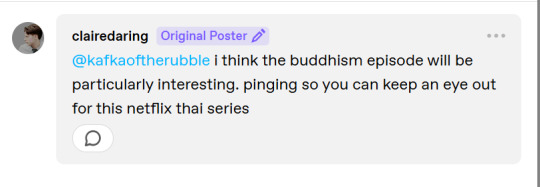
HAAAHAHA!
Dude, my best friend texted me last week (which I haven't even replied her yet ahhahaha what is this life) about this exact Thai series and for the exact same reasons as you do:

Basically, "Sci-fi and Buddhism have come."
Nothing tells me what kind of reputation I enjoy more than the sort of things people tag and text me about, man. I have become a Buddhist Philosophy Dispenser-Yapper in the neighborhood!
I am definitely keeping an eye out for the series just for being a sci-fi telling of a society that isn't touched upon frequently just yet (I've seen plenty of UK, US, and Korean-based sci-fi socio-drama).
But... AHAHAH I AM SO JUMPING STRAIGHT TO THE BUDDHISM EPISODE BEFORE EVERYTHING ELSE AHAHAHHA!
----
Fine. There's a pretty big reason for it. It's not really because it's explicitly about Buddhism.
"AI as An Actor"
This is actually one of the topics Last Year Me and Last Last Year Me et al. had been interested in.
Last year, I remember reading an excerpt about training large language models (LLM, the type of AI that outputs sentences and paragraphs, i.e. ChatGPT) on Bible quotes, as well as teaching it through large data of commonly accepted history about Jesus and his personality, to basically re-create Jesus as accurately as possible to offer advice and support.
In other words: teaching AI to roleplay Jesus among other historical figures who might not be religious.
And yes, because this is Lyndis you're talking to, I did wonder about "bringing back the Buddha."
I asked a Catholic friend who happened to be in my vicinity while I was reading about it for her thoughts, and she was naturally rather apprehensive.
I think the mimicry of historical persons—especially those who are long past and can only be reconstructed through our best historical data—sounds instinctively bad for good reasons. History is incomplete and is written by parties with different agendas, sources, angles, and more. The most objective historical evidence is often artifacts, and yet even they are created from circumstantial subjectivity.
Just look at how many kinds of depictions of the Buddha from different periods and places! Bro's handsomeness is so diverse across depictions, in our times you'd think he's catfishing pictures with the search term "top knot, curly black hair, long eyelashes, blue eyes, [28 more characteristics]..."
He was allegedly handsome in his youth; I tend to believe this because if you're compassionate, that qualifies you as good-looking to me already. Also HEY, HANDSOME MONK TEACHES MORE PEOPLE (Shh I am definitely talking about Mxxx Dxx)! The blue eyes were described in one of the suttas, the Lakkhaṇa Sutta, in the Digha Nikaya though. Are you surprised?
Even the suttas' truthfulness in describing the Buddha can be reasonably questioned since we could never be able to go back then and verify it for ourselves. That's the same for all historical records no matter how much effort we put in, yea?
Who gets to choose which sutta, account, historical record, and interpretation to be a part of this AI Buddha/Jesus/Florence Nightingale/Lyndis roleplayer? Who gets to decide which piece of history is correct enough to be a part of the system?
Even scholars debate about certain points among themselves, and though consensus does form a lot of times, it rests on the notion that it is impermanent, and may very well be revised upon further excavation, evidence, and re-interpretation. It is necessarily a long, unsettled, alive process. But will these AIs' programmers and stakeholders care to reflect that in their programs?
If you say, "Well, you shouldn't actually see this AI version as the genuine article; it's just here to give you the best answers from compiling the sutta." Then... what makes it different from simply asking a monk, a learned Buddhist scholar, a Buddhist Philosophy professor, or a discussion with fellow Buddhists? Why do we need him?
That's not all. The Buddhist doctrine of anattā, "non-self", also states that there is no such thing as a permanent self. There is only a process we call a "person"—who changes all the time due to cause-and-effects from the interaction between the mental state/psychological conditions and the physical world/environmental conditions (the more Buddhist term for the "person" will be "the khandha;" while the term to describe these interactions will be "dependent co-arising/pratiyasammupada." I spelt it right... right?).
If you read all my diaries up till I was 14, your mimicry of me will be a static version of me who stopped growing by 14 years old. You can predict how I'd be by age 29, but your imitation of an aged-up me will be very different from the Actual Person Lyndis... because there was never an "essential self of Lyn" in those diary pages you used to predict who I'd become. There was no real Lyndis. Just a process named Lyndis.
So, how real is the AI actor gonna be, if its aggregate is formed from data of the past but not given the chance to interact and grow beyond that point?
As a Buddhist, how do you justify the recreation OR creation of a self through technology... when you understand that there is actually no self?
Maybe one will say, again, "Okay. Well, it's meant to be a facsimile. Not the real Buddha; not a real monk."
But if that's the case... If the AI version of the Buddha isn't meant to be seen as the real deal, then why do we need him?
---
If the AI version of the Buddha has its advantage, then what could they be?
For a philosophy/religion that lionizes practice and empiricism, can an AI Buddha—who does not and cannot practice the Noble Eightfold Path—be a sufficient teacher at all? And that's just me musing about Buddhism. I haven't even mentioned others like Socrates, Mengzi, Ibn Khaldun, Hume, etc.!
What do people who care about Buddhism etc. want from AI historical figure roleplayers? Is it akin to an interactive answering machine? All the boring text from the internet, but presented by an artificial actor?
Or are we looking for an AI who can simulate the thought processes of these figures such that we can ask them questions they never thought of in their time, so they can give us wisdom we aren't confident enough to reason out on our own?
The Buddha never gave his views on transgender rights! Time to ask AI Buddha to give me some dhamma, babe. Hey Buddha, are you actually aroace?
--
The point is, yes, one goddamn news excerpt and Lyndis started to think about all sorts of things—before even reading up on what other experts might have considered as well. I think my friend just left me on the couch and chilled with her newlywed husband in their room that day...
I'm sure there are even more exciting angles to explore on this topic. This is the fun of speculative fiction, after all! I love sci-fi!
I'm gonna drop you an ask stemming from this ramble because I'm curious about your thoughts too, but you probably don't wanna reblog this one because it will derail from the original post! Ahahhahaha!
.... Thank you for reading my ramble?
Sneak Peak of the Cutting-Edge Futuristic Netflix Thai Original ‘Tomorrow and I’
What happens when hyper-advanced technology collides with traditional Thai beliefs and customs? Discover the answers in Tomorrow and I, a four episode anthology series that takes viewers on a journey through a futuristic Thailand where technology has become an inescapable part of daily life.
The cast includes Pakorn Chatborrirak, Violette Wautier, Waruntorn Paonil, Treechada Hongsyok, Ray Macdonald, Timethai, Thongchai Thongkuntom, Aelm Thavornsiri, Pongsatorn Jongwilas, Chananticha Chaipa, and Wanichaya Pornpanarittichai.
This groundbreaking series is directed by Paween Purijitpanya a trailblazing filmmaker known for his genre-defying works such as Body, 4bia, and Phobia 2. Paween has also showcased his talents with the feel-good series Seven Something, the boundary-pushing film Ghost Lab, and his exceptional direction in the episode “Liberation” of Girl from Nowhere Season 2. In Tomorrow and I, Paween reimagines four everyday scenarios in intriguing ways, starting with…
Episode 1: Bringing your loved ones back from the dead. Imagine a future where innovation has reached its peak, testing the boundaries of life and death. In this world, the cycle of birth, death, and being reborn may become an everyday reality through the technology of cloning.

Episode 2: Welcome to a place where technology meets intimacy. Have you ever felt that your partner couldn't quite meet your desires, or felt uncertain because you're still new to relationships? What if there's a city where technology might provide the solution? Enter a world where intelligent sex robots are designed to cater to every emotional and physical need.

Episode 3: What if a Techno-Monk joined the Buddha and the Dharma in the Triple Gem, replacing the Sangha? Imagine AI continuing ancient teachings preserved and upheld for over 2,500 years, revolutionizing Buddhism. Could this challenge traditional faith, or signal the end of the monastic order?

Episode 4: And if an entire city were submerged underwater after years of relentless rainfall, how would humanity survive? Would people fall into despair as the waters rose, or would they have to rely on "octopuses," potentially the last hope for survival? When this moment arrives, everyone will face a crisis beyond our species' abilities.

Unveil the future in Tomorrow and I, the year-end series that will spark your imagination and challenge your perceptions of a world where technology seamlessly integrates into every facet of our lives. Coming soon, exclusively on Netflix.

#Buddhism#I do also have to start creating a tag for all the times I touched a bit about Buddhism but not enough to actually be tagged “buddhism”#because I don't wanna crowd tumblr tag with things that aren't more explicitly Buddhist. Like pop culture stuff.#Like who wants to see 95% Neon Genesis Evangelion and 5% Buddhism when they look up the buddhism tag bro#So here goes!#Kafka's Buddhism hammer to all nails#so basically thailand edition of black mirror#<-you got it! Which is why I think the interesting thing is the societal setting. This is not the UK. This is Thailand!#and also why the Buddhism episode is the one I'm most interested in. Since it's gonna be confirmed freshest take out of all premises.#unfortanately it's also probably the most niche episode? A bit less accessible to non-Buddhist I think.#Hopefully I will have the time and KNOWLEDGE to analyze and explain the episode's Buddhist themes for anyone interested but “didn't get it.#Like the way I did for my beloved Sadhu! Ahahhahaha#netflix thai#tomorrow and i#อนาฅต#睿得失这个话痨的长篇大论
104 notes
·
View notes
Text
神祗的庐山真面目
//Forms and Names
I have always wanted to write three After God essays!
The first one came at the tail end of Chapter 58 discussing Ahu’az and Yako.
The second one was something I’ve always wanted to do—an interesting mental framework to analyze Tokinaga Sachiyuki.
Now comes the third essay, ironically, the first After God ramble formulated in our Discord conversation. Hahaha. The last essay in this series is the actual first one that started it all, @orange-peel-candy!
This essay concerns my speculations and hypotheses regarding the gods’ forms... and The Man Stronger Than the Gods.
Be warned: spoilers abound up till at least Chapter 58 (a.k.a. the last chapter I read!). It's also a very, very long read.
What Do We Know So Far?
I am a two-bit detective-scientist wannabe. Before we start to speculate, we should lay out some of the facts that we already know. I hope I didn’t get any facts wrong because I’m mostly going off from memory, which is pretty corrupted from things like work, daily life, Buddhist Philosophy (yes), science, Neon Genesis Evangelion (I’m disappointed in myself for this), the likes:
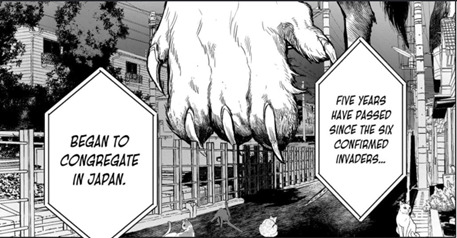
Chapter 1
Out of the four, we know three gods’ animal forms.
Vollof is a rabbit,
Ahu’az is a rooster (yes, calling it Chicken God was me being an ass),
Orokapi is a snake.
Did ya notice something?
----
Chinese Twelve Zodiac – the Calendar

Wikipedia
The zodiacs are used by the Chinese as a calendar system, which assigns an animal to a respective year following a twelve-year cycle [1]. The sequence goes like this:
鼠、牛、虎、兔、龙、蛇、马、羊、猴、鸡、狗、猪
Rat, Ox, Tiger, Rabbit, Dragon, Snake, Horse, Goat, Monkey, Rooster, Dog, Boar
Vollof, Orokapi, and Ahu’az are part of this group.
So, my bold first hypothesis is that—
All of the IPOs introduced to us will be animals from the Twelve Zodiac.
I assign a modest 78% confidence level toward this hypothesis since all three we have known have come from this group.
From here, let's go through these queries:
Are the other gods also animals from the Chinese Zodiac?
Where does Allula fit in this, if the Chinese Zodiac theory is true?
Is there anything about the Chinese Zodiac, such as myths and philosophy, that may serve as story hints for certain characters in the story?
Particularly, is there some basis to make a hypothesis regarding The Man Stronger Than the Gods?
----
Query #1: Are the other gods also animals from the Chinese Zodiac?
Well, we don’t actually have that many IPOs teased other than our 4 known gods. The only one we have, here, is the furry paw. Let’s look at it again:

Chapter 1.
Hypothesis 1: This is a tiger. [50% confident; 0.85 x 0.78 = 0.663; 39% overall confidence]
Hypothesis 2: This is a dog. [50%; 39% overall]
Hypothesis 3: This is an animal not part of the Zodiacs [22% overall]
Both a cat and a dog have 5 toes in their front legs (and 4 in their hind legs). But a cat’s dew claw is much closer to its other claws. A dog’s paw, meanwhile, has the dew claw being much farther away [2].

From Hepper.com.
This mystery IPO’s claws are certainly close to each other—including its dew claw. That makes it resemble a tiger’s claw more (Hypothesis 1, or H1). Another piece of circumstantial evidence is that this IPO was walking past a street filled with stray cats. If the IPO was a dog, I don’t think these cats could be this chill.
Nonetheless, H2 has good grounds, too. For what little we see here, the paw doesn’t show a tiger’s typical strip, and the tail is a little too bushy for a tiger. There’s also the fact that these claws aren’t protracted despite not being required during a stroll. A dog’s claw doesn’t protract [2]!
We can even explain away the cats’ relative calmness by positing the IPO as invisible to their eyes, kinda like how they can’t be captured by cameras.
Nonetheless, H1 and H2 have strong enough standing. Whether a tiger or a dog, neither conclusion will counter our zodiac hypothesis.
----
There is, of course, a 22% confident hypothesis where the IPOs do not actually follow the Zodiac convention.
This opens up a lot more options for our mysterious IPO—a wolf, a lion, a cat, etc.
There is also this little panel you’ve helpfully pointed out:
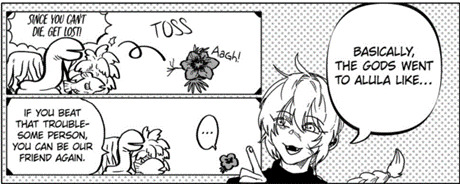
Chapter 44.
There appears to be a fish IPO in this panel, which is not part of the Twelve Zodiacs. The only true aquatic animal among them is the dragon, or龍 (long)。
If the fact that a Long is actually an aquatic animal is new information to you, I’ve once written quite a bit about it in (yes, I know. Why does this bro yap so much?) an essay for a good friend explaining the origin of the dragon’s orb. Long story short: dragons are seen as the kings of the ocean and storm.
There isn’t much hard evidence to refute this “fish” IPO. One suggestion (thanks to you) is that maybe the “fish” IPO is just an NPC and that all major IPOs will be of the zodiacs. Another suggestion I can think of is that, similar to how Vollof turned from a “bear” to a “rabbit” in execution [3], the “fish” IPO might be revised to another animal among the zodiac gang in the future.
One last thing to add to the Zodiac theory in general: apparently, there’s already another IPO planned with horns [3].
Three Zodiac animals with horns have yet to be featured: the Ox, the Goat, and the Dragon. It’s another piece of circumstantial evidence, but all of it together still builds a pretty good case for the Zodiac animal hypothesis.
The way to falsify this hypothesis is to wait for more IPOs to be revealed. Mr. Furry Paw, Mr. Horn, and, potentially, Mr. Fish—all three can prove or disprove this hypothesis.
For the rest of this essay, let’s consider the Zodiac Theory true.
--------
Query #2: What Could Have Been Allula’s Animal Form?
Allula’s floral form is actually a pretty interesting symbolic choice, which you noticed. She’s a poppy flower, right? The source of opium—one of the royalties of addictive narcotics. A really apt form for the god who introduced drugs to everyone else.
Nonetheless, this did not mean Allula had always been a talking one-eyed flower. She could very well have been an animal just like her other brethren.
According to Orokapi, Allula’s current form is a grotesque chimera of fleshes borne from the gods she had eaten. This tells us that she didn’t originally look like hair that’s been stuck in a pipe leading out from a bathroom hole.
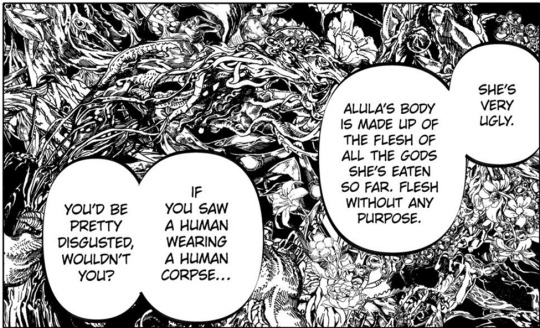
Chapter 50
What are the animals among the twelve zodiacs that could possibly be Allula’s original bestial form?
H1- Predators: Tiger and Dog. These were the two possible candidates for Mr. Furry Paw as discussed in Query #1. Could Mr. Furry Paw be Allula?
I don’t think so. Allula has been banished into reincarnating as Waka for quite some years, and when that happened, she’d already been losing her original form and gaining her chimeric look. Hence, it’s likelier that Mr. Furry Paw was another IPO!
Then what about omnivores, like Rat, Boar and Monkey (H2)? This, to me, seems more possible. Rats are certainly seen as repulsive and disgusting eaters. Monkeys are a bit harder to square since their “stereotypical” trait(s) in the common interpretation of the 12 Zodiacs don’t really fit Allula all that much, barring intelligence (more on that later).
---
My highest confidence level (about 50%) is on the Boar.
Boars are commonly seen as animals representing gluttony in East Asian culture. They technically eat anything edible and non-poisonous.
Here’s the thing: boars can develop a taste for raw meat [4]. And they have no problem eating human flesh or pig flesh! The most common incident of cannibalism in pigs is when the sows and gilts eat piglets, called “savaging.”[5].
Now, Allula is no mother, but she’s the only known god who eats other gods. An opportunistic eater with no repulsion toward the flesh of its kind. A cannibal.
A piece of circumstantial evidence: The Boar is seen as the intelligent animal among the Twelve Zodiacs, often similarly to how one envisions the Monkey. Allula has, in a lot of interactions, demonstrated frightening analytical capacity and intellect. She often uses it as a means of manipulation:
towards the other gods, she used drugs—something they had no idea about and became addicted to.
toward Shion, she managed to charm the girl with the combination of her eyes… and more importantly, her words.
She best displayed her intellect in Chapters 54 and 55. There, she worked out what she believed Tokinagawas up to accurately enough that he was reduced to near nervous breakdown. That’s the sort of skill in choosing conversation responses I wish I have, so I can make the NPCs in my game cry like a bitch.
Conclusion? I think Allula being the Boar seems far more likely if the Zodiac hypothesis is true.
-----
Query #3: Is There Anything About the Zodiac Hypothesis That Could Be Used to Understand After God’s Worldbuilding + Gods etc.?
The Twelve Zodiac was used as a calendar system with a twelve-year cycle. In other words, the zodiacs are associated with time [1]. Besides that, it’s cyclic. The Year of the Rat (first among the zodiac) follows the Year of the Boar (last among the zodiac) [1].
Both of these are already related to a character who isn’t said to be an IPO but is nonetheless completely intertwined with them—our boy Tokinaga Sachiyuki. Creating time loops to bring himself to his desired development is a known ability of his, isn’t it?
Keep that in mind.
Now, I’m gonna introduce to you Taoist/folk Chinese deities associated with the Twelve Zodiac:
Tai Sui, 太岁 (literally “great year” or “great age”).
Like plenty of Taoist gods, these deities originated as stars observed by Chinese astrologers—in this case, they’re the stars opposite Jupiter and are also in a 12-year orbital cycle [6].
Tai Sui are considered generals taking orders from the Jade Emperor (the lord of the heaven in Chinese mythology). They are the zodiac animals’ masters. Throughout dynasties, the Tai Suis’ numbers have multiplied into sixty of them, each mastering one animal while corresponding to one of the Five Chinese Elements (五行: fire, earth, metal, water, wood). There is, however, one Tai Sui General who is the boss of all Tai Sui; this one has no governing year [6].
That’s, of course, the Chinese’s side of things. In Japan, Tai Sui is consolidated into a single deity [6], in the form of Tai Sui’s full title, 太歳星君 (“Lord of the Tai Sui Star”)。
Tai Sui is so important and revered in folk divination that people whose zodiac animal sign is the same as the deity are said to be “clashing with Tai Sui” (犯太岁). Take the Year 2024 as an example: this is the Year of the Wood Dragon, so it is governed by the Wooden Dragon Tai Sui. Everyone whose animal sign is the dragon (no matter the elements) is therefore “clashing” with him, and superstitions dictate they appease the god because their overall luck has already tanked by the virtue of this clash.
What does this tell us?
It tells us that a Tai Sui is “stronger than these zodiac animals.”
Tai Sui, the god of time. Not linear time either—cyclic time. Who does this remind you?
More circumstantial evidence for your consideration:
The word associated with “time” is in Tokinaga’s name, 時永。 This is similar to how the word related to “time” is also found in Tai Sui, 太岁。 The difference, however, is that 時 technically means “hour,” while 岁 means “year.”
The pronunciation for 太歳星君 is Taisai Seikun ( たいさいせいくん) in Japanese [7]. The initials are T.S., which matches Tokinaga Sachiyuki. You can almost wonder if Tokinaga’s name is chosen to mirror the name of this calendric time lord.
You might think this is the end of Query #3, but there’s a speculation I want to put forward based on the Tai Sui Hypothesis.
“We Have Seen the Man Stronger than the Gods”
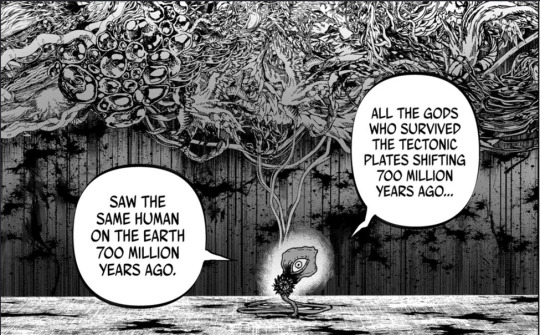
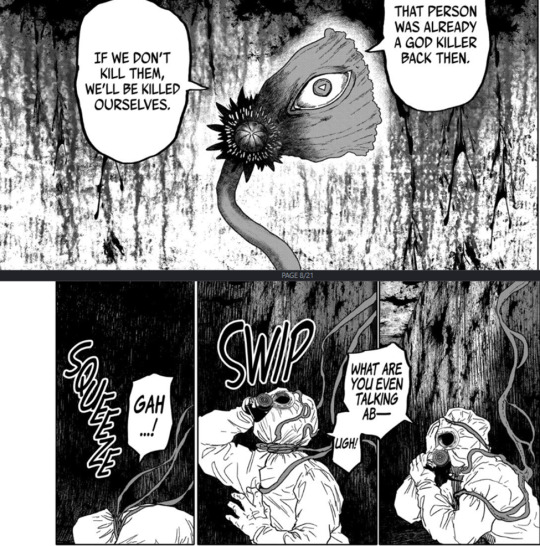
Chapter 49
Allula claimed that she and the other gods had seen The Man Stronger Than the Gods/God Killer before—a long, long time ago. 700 million years ago, to be exact.
Here’s the thing: Tokinaga is only 28 years old.
The big upheaval of the IPOs from the North Pole happened 30 years ago. Hell, modern Homo sapiens evolved from merely 300,000 years ago. My math ain’t no Olympiad level but methinks this math doesn’t check out.
That’s not all. Tokinaga’s power comes at the cost of body degeneration. How did this blud—whose body started to look like lichens-ate-it just by rewinding time a little to his last save point—manage to survive this long?
Another odd thing: Allula somehow does not recognize the God Killer when she sees one. Why? Why doesn’t she recognize what could possibly be the only Homo Sapien on the planet at the time? If that man was Tokinaga, wouldn’t she recognize him right now?
Tokinaga’s response to Allula’s assertion is also grounds for intrigue. He was there for a negotiation; the odds of him feigning ignorance were not too high. So why was his response “What are you talking about?” instead of knowing silence?
Why did he react as though he was stunned to hear Allula’s revelation? Was the God Killer she mentioned somehow… not him?
Granted, there are many plausible reasons to explain these odd points. We don’t know the full scope of Tokinaga’s powers. Maybe he could erase someone’s memories if he wanna (sure. Sure. Sure. Sure. Sure. Doubt. Doubt. Doubt. Doubt. Doubt). We don’t yet know what parts of the power system, such as reincarnation, are like in this story.
---
God Killer (singular?)
If Tokinaga’s aspect as the time-bending God Killer is inspired by Tai Sui, then the speculation I want to offer is that there is more than one God Killer across history.
Japan etc. and even common Chinese folks might think that there’s only ever one Tai Sui Lao Jun/Taisei Seikun, but there has always been more than one Tai Sui in the canonical myth. Tokinaga could very well just be one God Killer who exists at this time. The one Allula and fam saw back then was another God Killer.
I originally wanted to make a joke that this God Killer was from the Australopithecus genus—the hominids before our Homo genus. The problem is… the earliest Australopithecus hominin existed 4.2 million years ago. That’s not even close to Allula’s “700 million years ago.” Bro, who the fuck did these gods see? Fucking Xenu?
The nature of God Killer(s) is largely shrouded in mystery by this point in the manga, so again, any reasonable guess is as good as another. I’m not even particularly confident in this speculation, but it does lend nicely to our last query…
----
Query #4: What speculations regarding “The Man Stronger Than The Gods” can we make from this?
Although this is the last query and hypothesis in this essay, it is actually the first I’ve ever made since reading After God months ago.
The thing that kickstarted this was in his name.
As someone who’s immersed in Thai and Buddhist-Hindu myths, his name was eye-catching for featuring the word “naga.”
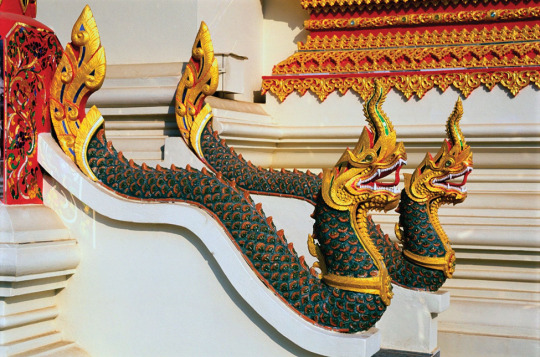
Britannica. This is an artistic depiction of Nāga in Thai style.
Nagas are, briefly, divine or semi-divine beings—sometimes half-human and half-serpents, sometimes basically sea serpents [8]. In common translations as well as general understanding, however, nagas are understood as dragons.
They are often associated with bodies of water.
The origin of the nagas is closely related to snakes. In Sanskrit, nāga is one of the many terms for “snake,” and the earliest concept of nagas is cobra-like [8].
These three key points are bolded because these traits are shared with the East Asian concept of the Long (龙) as well. According to Yuan Jing, a Chinese archaeologist researcher, the origin of Chinese dragons (which other East Asian long are derivative from) likely evolved from a snake or a crocodile [9]. For example, artifacts recovered from the Taosi Archeological Site (陶寺) in Shanxi showed Long that pretty much just looked like snakes [9]. This connection is also speculated to be why “dragon” is positioned next to “snake” in the Twelve Zodiac. The dragon and the snake are kin.
And who, my dudes, is Tokinaga’s dearest friend?
Even an East Asian dragon’s “connection to the body of water” can be seen in Tokinaga’s character traits—chiefly, his avoidance of bathtubs and his strange discomfort with showers. You might correctly point out that it’s odd for him to be written as repulsed by a “body of water” if he’s indeed related to East Asian dragons, but a big theme of Tokinaga’s personality intrigue is the fact that he’s in discordance to himself. His self-hatred originates from his inability to resolve what he detests and what his “nature” desires. He’s like an Asian dragon who hates water.
Oh, but there’s more to this hypothesis. Much, much more.
-----
Fake Ancient Scripts That Repel Evil

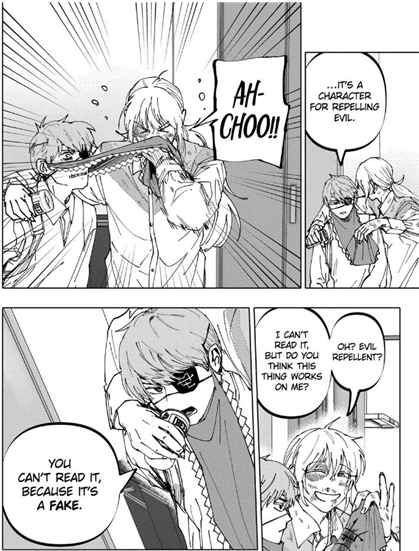

Chapter 31
Well, the characters on his loincloth-ass mask seem pretty likely to be 日本, “Japan,” to me. You're not even trying, Orokapi.
We know that the eyepatch hides Tokinaga’s empty left eye socket where some of the deterioration is found. So what’s the character on his eyepatch?
The eyepatch, interestingly, was framed nicely within the last panel as Tokinaga dropped one of the earliest hints about the God Killer.
I’m gonna go and guess it’s based on “竜”, or “dragon.”
It’s that, or 龟, “tortoise/turtle”.
How do we decide which of these is likelier? Well, show us the hand!
----
It's not a hand, you dumbass. It's a claw.
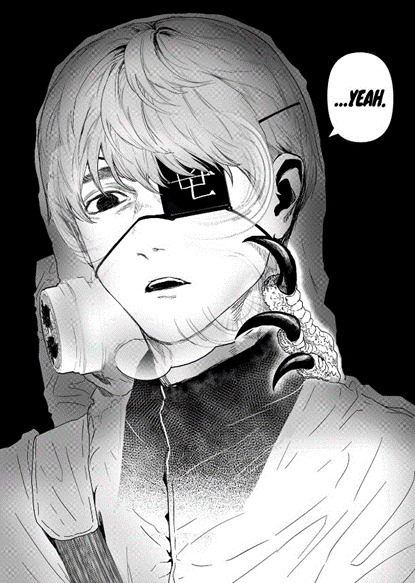
Chapter 42
This chapter is the first time when we get to see the claw that haunts Tokinaga. It features really sharp nails and scaly skin. Below are a tortoise’s nails.
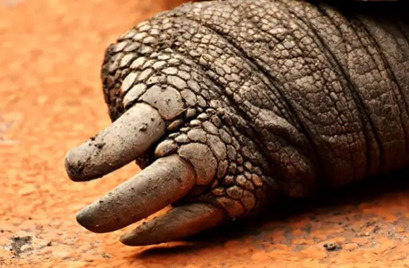
Animals.net
The nails in a tortoise appeared to be closer to each other that our mysterious claw up there. The claw is also far leaner in the panel, compared to the more bulging (thicc?) look of a tortoise’s foot.
Based on this, I think the odds that the claw belongs to a tortoise are lower than our alternative: the East Asian Long/dragon. But do we have more proof?
---
How many nails does a Long have?
Five claws may seem ubiquitous in more modern drawings of the dragon, but it’s actually a relatively new invention during the Qing Dynasty [10]. In truth, for the longest time, the dragon has had three claws—and the dragon types that were most likely introduced to Japan are the three-clawed and four-clawed Golden Dragon (金龙), both popular during the Tang Dynasty.

Baidu. Tang Dynasty dragon-adorned mirror. Try to locate its claws.
Now, we can combine both knowledge.
Tokinaga claimed that these fake scripts are used to repel evil.
One of them is found in his eyepatch. A writing that may very well be 竜.
What is this eyepatch guarding against?
The thing that is frequently drawn to be close to his left eye is the mysterious claw. A claw that can be reasonably suspected to belong to a dragon.
Does that eyepatch repel... or seal a dragon?

Chapter 55
No matter what it could be, it still points to one general direction:
Tokinaga has a lot of connections to a dragon.
-----
Verdict
This is a combination of all of our hypotheses to form a pretty damn bold speculation about The Man Stronger than The Gods.
Tokinaga may be a God Killer, not the God Killer. He has aspects influenced by Tai Sui and dragons—a mythical beast that is also one of the Twelve Zodiac.
We already learned that there are actually a lot of Tai Sui deities, with 5 governing a single animal of different elements. So, if the hypothesis is that the God Killer is not one person but many people...
Is Tokinaga a dragon-related God Killer? Similar to a Dragon Tai Sui?
-----
Last words
This has been an insanely long read, but it covers a lot of the speculations and theories I have had about After God thus far. There’s a lot we don’t know yet, and it’s always likely that I get a lot of stuff wrong. I have a specific image for that occasion:
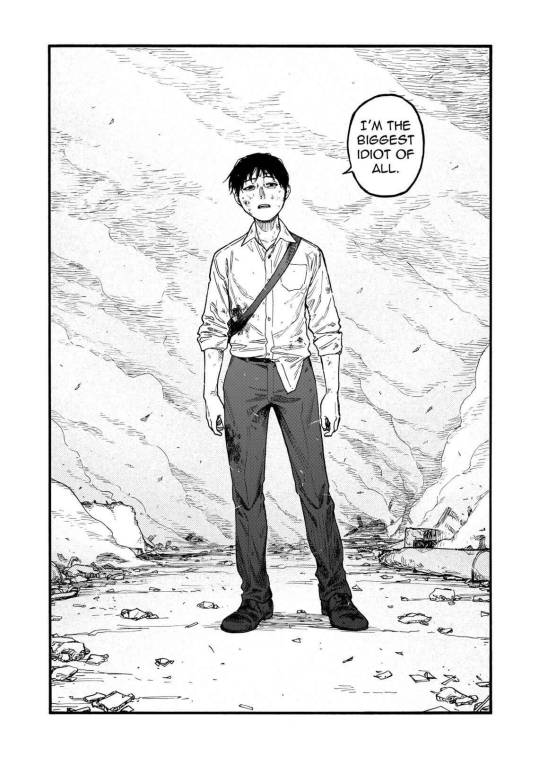
Ajin.
Nonetheless, it’s been really fun trying to Allula out the story with what we have so far, and I’ll be really stoked if even a small part of all of this comes true!
Let me know what you think in the comments or tags! I love responses and add-ons; I read ‘em all! They make my day.
Thank You For Reading My Ramble! I hope this has been an eye-opening thrill for you!
P.S. To people who recently followed me for After God content: welcome to my garden! I do have to tell ya—I’m not very prolific an essayist due to my general lack of time. I also write essays for a lot of other things too—this is the last of my After God Three Part essays, and I haven’t had any planned after this. So, yea! Please enjoy what I've cooked for now! Ahahaha.
------
Citations:
Chinese zodiac. In Wikipedia. https://en.wikipedia.org/wiki/Chinese_zodiac
Cat Paw vs. Dog Paw: Vet-Verified Differences (With Pictures). Hepper. https://www.hepper.com/cat-paw-vs-dog-paw/
Inspiration for Vollof (summarized). On Tumblr (Thanks, Ko!). https://www.tumblr.com/kossanctuary/756356794456113153/inspiration-for-vollof-summarized?source=share
What Pigs Can (And Can’t) Eat: Ultimate Guide. Savvy Farm Life. https://savvyfarmlife.com/what-pigs-can-and-cant-eat/
Normal and Abnormal Behaviors of Swine Under Production Conditions. Pork Information Gateway. https://porkgateway.org/resource/normal-and-abnormal-behaviors-of-swine-under-productions-conditions/
Tai Sui. In Wikipedia. https://en.wikipedia.org/wiki/Tai_Sui
太歳星君. In Wikipedia. [In Japanese] https://ja.wikipedia.org/wiki/%E5%A4%AA%E6%AD%B3%E6%98%9F%E5%90%9B
Nāga. In Wikipedia. https://en.wikipedia.org/wiki/N%C4%81ga
世间动物千千万,为何是它们被选入十二生肖?《澎湃》。[In Chinese] https://www.thepaper.cn/newsDetail_forward_24694111
中国古代的龙,到底有几个爪趾?《百度·文艺时光》。[In Chinese] 中国古代的龙,到底有几个爪趾? (baidu.com)
#after god#after god meta#ramble with citations#long read#睿得失这个话痨的长篇大论#tokinaga sachiyuki#Idolatry Prohibited Organisms (After God)#All Chinese citations were not read with the help of AI or translation. I know Chinese ahhahah#this really took a lot of effort. Which is why I hope it was a satisfactory meal#I can't cook as much as I wish I can... Stupid work...#Happy After God Monday!
38 notes
·
View notes
Text
聊聊俺另个冷圈子漫画《AFTER GOD》: 解析、猜测、评论(暂至第58话,英译版为准)
An analysis/speculation/ramble of the manga, After God.
Edit: Upon re-reading some previous chapters for my next ramble, I realized that Yako's name isn't actually "Furuya Yako," but "Furuya Rin" (C56). I'd like to change it accordingly.
The sort of things I'll do for you, @orange-peel-candy, man. Yes, this could have been our Discord conversation, but it’s been a long time since I contributed something to this garden, and the After God appreciator circle is once again, a cold circle (冷圈子) that I thought hey, Future Lyns will enjoy reading. Maybe someone else other than you will, too?
This is up to Chapter 58, "They Don’t Understand."
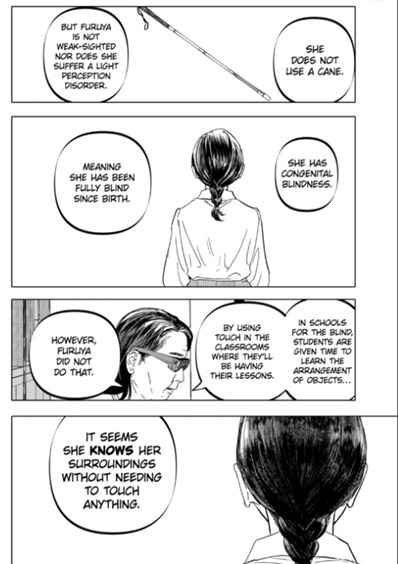
I’m gonna reiterate some of the interesting things we mentioned back in Discord.
The latest chapter is cool because it showcases how Yako sees the word. “No colors; just lines. Faces are blocked out.”
Apropos of that, I’m personally stoked to see the mangaka spending time establishing the different kinds of visual impairment that might get someone to be legally or functionally declared “blind.” Then, via the elimination method, we get to see just why Yako stood out even within the community she is easily a member of owing to her congenital blindness.
---------------
Blind Perspectives
In the first part of C58, we see the Outsider Auntie describing how much of a stand-offish creep Yako was. Her opinion is likely similar to what readers might have felt about Yako since she appeared in the story.
But, in the second part of the chapter, we got to see Yako reminiscing about her dad’s funeral, her mother, and—we soon find out—the first time she met Chicken (“Rooster,” this distinction is actually important, but I think I’ll make a separate post about it) God. In that flashback, she’s still a little peculiar... but is largely a quiet girl with pretty normal sensibilities. She was defensive of her mother’s character and questioned—but not disparaging of—her long-absent father. She even displayed kindness to a creature she identified as a “parakeet” found near her dad’s coffin.
Little thought that goes nowhere: Child Yako reminded me of a live-action character we really like: India Stoker, from the movie Stoker. They both elicit a peculiar bearing partially from their atypical sensory experiences, are seen as “unsettling,” and are left alone. Man, I dig characters like these. So ghostly.
This is why I’m very interested in C59: it will be a continuation of Yako’s memories of how the Chicken God and her life entwined. Sure, we’ll also get to her reputation as a butcher of eighty lives, but I’m at least 80% sure that the slaughter is related to Chicken God. How the slaughter happened (was it via her new power? Poisoning? etc..), though, is a lot less clear.
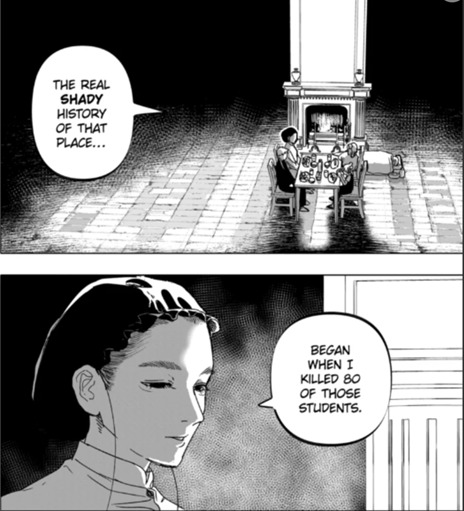
Juxtaposing Yako and Outsider Auntie’s perspectives like these made me wonder if Yako had always been as off-putting as the latter claimed. Could it be that, at first, Yako seemed weird because of her nigh-superhuman way of navigating through her blindness with an accuracy other peers like Outsider Auntie could only dream of? Did jealousy introduce a distortion to the Outsider Auntie’s assessment of Yako’s character?
As you pointed out: both narrators are unreliable.
I think that’s a good reminder. So here’s the follow-up:
Is the answer to who Yako is somewhere in between these two perspectives, or does it lie in a third position?
In other words: will Chicken God’s account of Yako’s personality end up being the most accurate version of who she is?
It won’t be surprising if the last part turns out to be true. Alula and Orokapi, who are both IPO/gods, seem to have the most accurate perspectives on Tokinaga compared to any other humans in the story—possibly including Tokinaga himself. Alula also seemed to have understood the sides of Shion that had eluded Waka until the time of their closure.
I think the gods’ impoverished understanding of humanity, plus their lack of emotional and experiential biases, actually gives the gods a clearer, fresher grip on the humans they are interacting with.
However, there’s a downside to learning about humanity with a blank slate. If you dip a piece of white paper into, say, a bucket of blue dye, you’ll get deep-blue paper. Then, no matter what color you try to paint on it later, the blue dye will influence how these colors present themselves on that paper, right?
That’s the second point—and hypothesis—I want to lead to.
-------------
Formative Experience
You observed that it’s strange that Chicken God relied heavily on others to do its bidding while Orokappi (and presumably others) show no such reliance. You’re right, and as always, you give me one really important lead-up to this hypothesis!
The gods described humanity as an infection, yea? We’re their Covid-19, monkeypox—you get the idea. Getting close to humanity, to them, risks being infected by our behaviors and ways of thinking.
In other words, the gods’ first and sustained interaction with one or more, humans greatly influences much of their personality development.
Orokapi
Orokapi’s first sustained interaction is with Tokinaga, who—due to knowing his OG’s sob story about being a loner with bad decisions and no friends (unless he wanted to include debt-collectors or whatever as “friends”)—offered Orokapi friendship with as little prejudice as possible. Even when Orokapi exhibited behaviors considered offensive, repulsive, or even disgusting, Tokinaga simply—persistently—corrected him and took care of him. Orokapi is Stitch to Tokinaga’s Lilo, y’all.
It’s pretty strange especially after we learned who Tokinaga actually is and what he really thinks of the gods.
But the main point stands: Tokinaga teaches Orokapi about friendship. The human notion of it, with all its complexities.
I argue that this is, therefore, Orokapi’s formative experience of humanity. This is his version of the humanity infection.
Orokapi is also notable among the gods for being one who embodies a human being. That is, he borrows a human body and lives like one—likely similarly to Allula. That affords him more formative experience with a human’s spectrum of emotional complexities—which again, because of Tokinaga, is related to the concept of friendship.
All of this culminated in his last run-in with the Rabbit God, Vollof. They had been dear friends before Tokinaga was a thing in Orokappi’s life, and yet Orokappi voiced vexation on how to help his dearest bunny-eared friend. Rabbit God was important to him, but Orokappi didn’t know how to be a friend. In the past, he could only provide surface-level help like alleviating Rabbit God’s drug withdrawal symptoms with his toxins.
However, in their last encounter, Orokappi demonstrated emotional intelligence and sentiments paralleling Tokinaga’s treatment of him. The Snake God had used what he had learned and finally gave Vollof the peace and comfort it didn’t even know it wanted.
This was Orokappi’s humanity infection, manifesting. And it looks a whole lot like platonic love.
Orokappi ate Vollof and subsumed Vollof as part of his “self”—this seems to be a property of these gods, as Allula also seemed to have gained her chimeric form this way (hers is characterized more as “lust” than love though if I remember correctly). Interestingly, he expressed similar sentiments toward Tokinaga and wanted to eat him too.
The intrigue posed by Orokappi’s desire to eat Tokinaga and the latter’s own profound suicidal ideation is better discussed in another post that talks more about my mate’s psychology. So I won’t continue beyond this point!
-----
This is the basis for my hypothesis as to why Chicken God relies so much on cult followers. I’m about 75% confident of it.
Chicken God Ahu'az
Here’s what we know:
Chicken God was found by Yako in her own house, near her dad’s coffin.
Yako’s mother founded an abacus school.
She had quite a significant number of students, who seemed less interested in abacus and more in her charisma (and beauty). After all, Yako’s mom “talked a lot” after teaching for a bit, basically making her more of an orator than a teacher.
Her school fees were cheap.
Outsiders characterized the school as “a suspicious group of people,” stopping shy of outright calling it “a cult.”
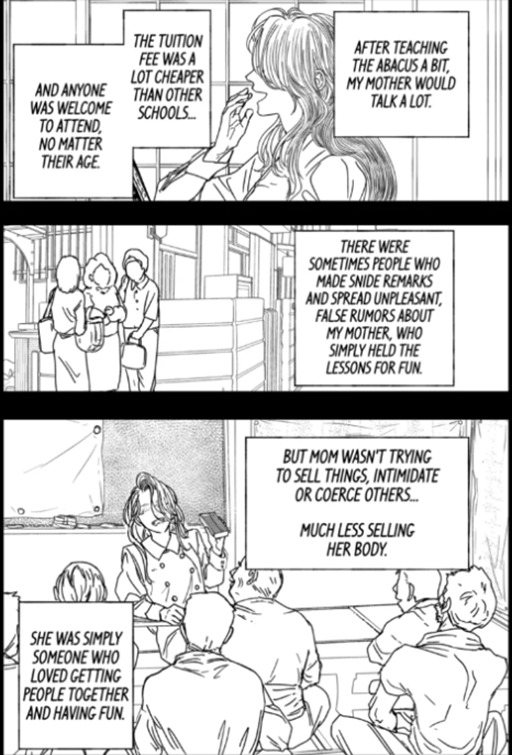
Here’s what we know about Chicken God:
Bruh is the god of a cult.
Bruh doesn’t kill all humans—it lets those who are sickly or weak live. Could this be pragmatic—giving these desperate human powers and a second chance will strengthen their faith in it? Or did it actually possess a soft spot for the marginalized and/or variously disabled?
Bruh relies heavily on its followers to do its bidding.
For a time, bruh lived in a pond near the Furuya’s house.
Chicken God seems to be the closest to Yako despite proclaiming its contempt for humans.
Chicken God presents itself to humanity instead of embodying a human form.
The lowered fees, and the stated purpose of her starting such a school in the first place, suggested that there’s a chance the school attracted marginalized people. People who may live on the fringes and were forgotten by society.
At this point of the flashback, all of the attendees were male. But that doesn’t mean this won’t change in the future. Perhaps following Yako’s murder, the school became an actual starting point of a cult.
Either way, going from what the rumors said, Yako’s mom’s abacus school likely showed a fervor toward her in ways comparable to a following. Chicken God was already living in proximity to a dedicated group as soon as it regained power and sentience.
This backdrop was Chicken God’s formative experience of humanity.
If Orokappi’s formative experience centers around friendship—what if Chicken God’s centers around worship?
Side note: this will once again pit the Snake God and the Rooster God as foils, especially considering how much the two seemed to hate each other’s guts. Friendship denotes equality between all parties, but worship demands a designation of the superior and its inferiors.
It wouldn’t be hard for Chicken God to assume the role of a god, either. The IPOs’ eyes already have a hypnotic quality inducing religious-like devotion toward them. The questions I can ask, therefore, are:
What happened to Yako’s mom? Was she eaten by Chicken God, and so come to assume a womanly form if it so wished? If this was true, then Yako’s feelings for the Chicken God could very well be mixed with a child’s affection towards her mother.
Or did Yako’s mom perish in the clash occurring between this cult and the government when they found out about Chicken God?
Who were those 80 students, and to what purpose were they killed? How did Chicken God factor into this?
Was the Chicken God’s habit of granting favors to the weak, disabled, and marginalized a pragmatic preference, or a result of its formative experience with humanity?
What was Yako’s mom’s role in all of this? Was she the first follower, and therefore the first priestess? Or was she horrified by the abomination her daughter had awakened (though hinted to be her husband’s finding; more on that later)?
The last question concerns the origin of the Chicken God. If I recall correctly, all IPOs used to live scattered across the globe, until for some reason, they began to gather in Japan. Correct me if I misremembered about this one.
This is where the little tidbit of Furuya Shigetoshi’s scholarly pursuit comes in.
-------------------------
“We joined him to take part in the excavation of Uruk.”
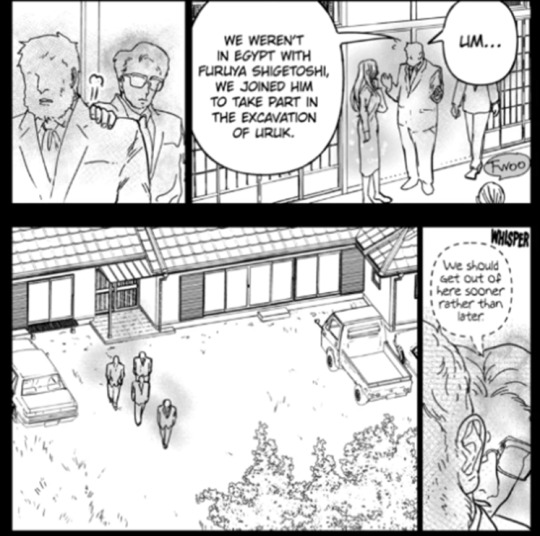
My neural network remembered Uruk enough to immediately think, “Mesopotamia?” So I went to double-confirm.
Yes, Uruk was an important city for Sumerian urbanization. It’s so ancient that it has multiple layers of cities built on top of an older city. It had seen quite a lot of rise and fall in its lifetime, including its annexation by the Neo-Assyrian Empire around 850 BCE[1].
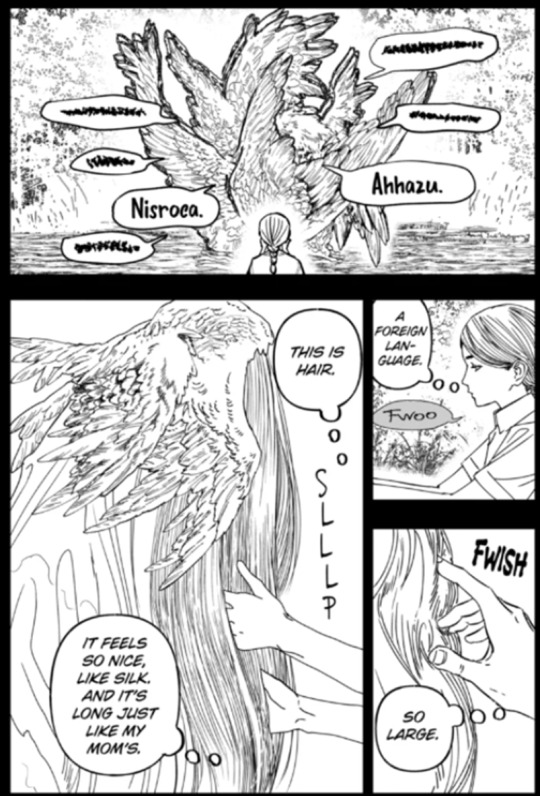
The actual name of the Chicken God, Ahu'az, seems fictional. But the word “Nirosca” reminded me of yet another thing I read before, so I went to check. Again. Well, the only thing that I found closest to it was “Nisroch,” which was some god of Assyria[2].
There had been a scholarly effort in trying to ascertain what kind of god Nisroch was supposed to be. Apparently, in the 1840s, a British archeologist had mistakenly identified “winged, eagle-headed genii[2]” figures as “Nisroch.” Near Eastern scholars nowadays refer to them simply as “griffin-demons.”
There are two points here that converge to one specific ancient Mesopotamian civilization: Assyria. I don’t know if this is the period Chicken God would reveal to have gained its first sentience, but I do wanna show you this Neo-Assyrian ivory sculpture[3][4].
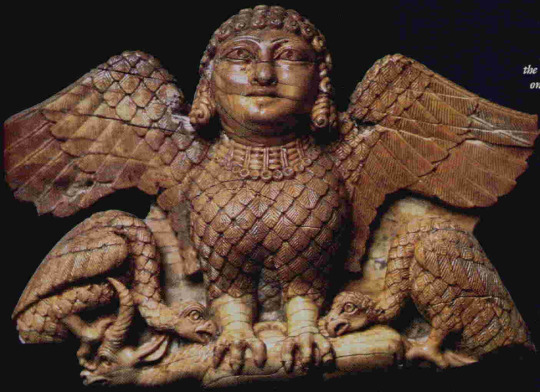
Assyrian winged Sphinx, excavated from Kalhku (now Nimrud).
From Yako’s memory, we learn that Chicken God wasn’t always a bundle of wings and some occasional chicken feet. It could even possess long, silky hair—one Yako compared to her mother’s.
Could our Chicken God originate from the Neo-Assyrian period of the Mesopotamian civilization, within the context of After God’s universe?
I’m 90% sure that it came with Professor Shigetoshi and somehow fell out of his person near his own coffin, which Yako picked up. After all, before these gods were “gods,” they seemed to be very microscopic—almost like bacteriophages, or something similar. It wouldn’t be surprising if micro-Ahu'az hitched a ride on a certain Japanese man—or if captured by him—and came here.
But of course, there’s this talk about how the IPOs had been moving to Japan despite their places of origin. Who’s to say that this wasn’t the directed work of someone, which would have allowed his job of exterminating these gods easier if they were all in one place? Perhaps someone even more ancient than the gods are supposed to be—and an enemy of them, no less...
---
Well! How the fuck did I get here?
And this isn’t the only After God hypothesis we have. There’s the one about the animal representations of each god which could lead to a full-blown essay about Tokinaga, your (unexpected) favorite character (thanks to me! Ahahahhaha!). Not that I mind. I really like Tokinaga too. He’s so juicy and interesting—and Orokapi is just as intriguing too.
Hopefully, other fans of this manga will find this an entertaining read. If you’ve stuck out here for this long—
Thank you for reading my ramble!
-----------------------------
Citations:
“Uruk” in Wikipedia. https://en.wikipedia.org/wiki/Uruk
“Nisroch” in Wikipedia. https://en.wikipedia.org/wiki/Nisroch
“عاجية اشورية تظهر طائر برأس انسان من كالخو ( النمرود حالياً ) القرن التاسع ق.م” in History of Mesopotamia. Twitter. https://x.com/GilgameshIQ/status/1537489293500899329
Nimrud Ivories عاجيات النمرود in Iraq In History. https://www.abualsoof.com/61-assyrian/detail/8604-assyrian-empire-age?tmpl=component
#after god#after god manga#after god meta#Ahu'az#furuya rin#after god yako#orokapi#tokinaga sachiyuki#ramble with citations#睿得失这个话痨的长篇大论
31 notes
·
View notes
Note
Hi! I've really enjoyed your tags on the reblog of the screencaps of The Believers on my sideblog @nonkunchanon. I was wondering what are your thoughts on Monk Dol's next move now that he's been rejected by Dear, whether he would disrobe or not. And I think Pup will be back for The Believers Season 2 though, since at least according to this interview, it seems like Pup is ready to shave his head again to be Monk Dol. Also do you think Win has any feelings for Dear?
HOLY SHIT. With this ask you've basically allowed me to ramble about The Believers. THANK YOU THANK YOU SADHU X100 Also, Pup has an interview?! And he's ready to be Monk Dol again?!
SADHU X1000. Thank you for linking it, fella appreciator!
Okay. I'll tell you what I think, but you're gonna have to reblog this and tell me what you think too, because I'm also interested in your thoughts!!!
---
Monk Dol's next move
Okay! There are two perspectives I can go for: the showrunners' + actor's, and the character's. Judging from both Thai and international fans' reviews and reception, Monk Dol is a really, really popular character, isn't he (who can blame him)? Popularity usually incentivizes bringing a character back for Season 2, and Pup does seem pretty happy playing the character. All that means there are really good grounds to think he'll return, ahahhaha! I'm with you on this one!
However! From the character's perspective, it's a bit more nuanced, methinks!
I, uh, study Buddhist Philosophy for fun, so I can tell you that the biggest reason why I like Monk Dol is that every single dhamma talk/sermon he gave, as well as his character traits and personality, are aligned with Buddhism. In a show criticizing the commercialization of Thai Buddhism (and its relation with politics), Dol provides an example of what Buddhism "is supposed to be about."
I've been rewatching the series every now and then when I'm free, so I got to re-watch his scenes and Dhamma talks. The teachings are actually legitimately correct. Not even "Pop culture-diluted correct" or "I guess it's a correct interpretation," but befitting the dhamma as espoused in Theravadin Buddhism, which Thai Buddhism falls under.
That means Monk Dol's themes and character arc are deliberately woven with Buddhist philosophy, including concepts like anicca ("impermanence") and nekkhamma ("renunciation; letting go"). This makes it harder to write him back into Season 2 without hurting a little of the themes he's supposed to represent, you see?
In his letter to Dear, he talked about how, thanks to his love and attachment for Dear, he realized that "there are many more things about myself that I need to train on." It's a very Buddhist sentiment (the Buddha's last word before death/parinibbana was, reportedly, "strive diligently." You might also remember one of Dol's Dhamma Talks on the importance of self-effort over superstitious reliance on holy objects and the Buddha; it was his first talk since joining Wat Phummaram).
The way he exited the story was him practicing nekkhamma and the sort of "love" he talked about earlier. He also alluded to their interaction as remnants of their past kamma (this is how it's spelled in Pali; it's "karma" in Sanskrit) influencing their current lives.
Just a brief explanation in case you don't understand the "kamma" thing! In a supernatural reading of kamma, the effects of your actions in your past lives with other people can bring over to your current life. Therefore, Dol was saying that him falling in love with Dear/Dear unintentionally "charmed" him was no fault of himself nor Dear, but simply the effects of their collective kamma. He merely saw his experience—of falling in love and being rejected; of being conned and used because of said love; the general dukkha (suffering) of it all—as a lesson illuminating aspects of himself that he should overcome.
Dol recognized that he needed to let go of his attachment to Dear as she never belonged to him; previously, he explained that as part of the Buddhist doctrine of Anattā ("non-self") when he answered Dear's question about love. He also told her not to remember him, which to me, all adds up to him hoping this is it. He's hoping that the effects of their past kamma had burned out.
Now, if they want to continue the Buddhist philosophical theme undergirding Monk Dol's character, then the "good end" will be him not showing up in Season 2 at all. From a storytelling perspective, it makes sense too: his arc has a definite end already.
----
However, I can also imagine ways to pull Monk Dol back into the fold without costing his underlying Buddhist themes. For one, "kamma," to the Buddha, mostly means "action" when it's not "cause-and-effect." While Dol would like to think his kamma with Dear is over, it's also possible that his actions and interactions with Dear—and to an extent, Win and Game—have planted seeds of their own, with their own effects to be reaped. These effects can be explored in Season 2.
Where should he go? He has already exchanged his forest monk lineage for a city monk's, but his idea of Buddhism is embodied in the Thai Forest tradition, not the city ones. Can he return to his original forest temple, though? We saw that he was "punished" by one of the eminent temple monks when Win and Dear were trying to collect sacred ingredients for their amulet.
His changing of lineage was not without consequences, and it's a bit hard to imagine him being accepted back to his original temple easily. Thai Forest Tradition is a lot stricter than other schools in Thailand, and a monk who pivots from one school to another can be seen as wishy-washy, unreliable, lacking in discipline, and rather disgraceful by forest monks.
Hence, I would imagine that he either joins a very remote forest temple far away from Wat Phummaram and the show's central background region... or becomes a solitary monk.
No matter which way he chooses, though, I can imagine him being even more ardent in his practice, and perhaps rather avoidant of female laypeople. Even if he has no intention to discriminate, he might try to overcorrect his previous lapse with Dear by putting a wide berth between himself and other women no matter their intentions. I can also imagine him struggling with the actual process of renunciation, which is never as easy as it might sound. His experience with Dear is going to affect him a lot. Even dreams of her are possible.
And from there, I suppose there are two ways for him to join with the trio's Main Plot. Either he coincidentally gets roped back into their activities, or he deliberately looks out for any news about Dear and her gang because he still cares about her wellbeing.
If Monk Dol takes a more active role, he might gradually come into the line of fire by standing up against this sort of commercialized Buddhism. He might also try to help Dear (plus Win and Game; it's more understated, but Dol also cares about those two. We see it in the interrogation scene) to get out of their quandary.
I think Dol will be quite punished for his actions, though. As in, he'll suffer quite a bit. Not sure if he might die, per se, but I'll suspect something worse than what he got in Season 1. I hope he doesn't die, but that's only because I'm personally no fan of martyr tropes, ahahha!
There are also significant odds that Dol will manage to change Dear and Game's hearts through his actions and counsel once he rejoins the trio in the Main Plot. It will be harder to reach Win, I assume, because Win is the least receptive and warmed up to religions, and his attitude toward Buddhism has been very irreverent. Throughout Season 1, Win's attitude toward Monk Dol has been that of a tech bro looking at his most valuable asset.
Nonetheless, Dear and Game, being Win's friends, can bridge that gap along with Dol and Win's mother. Philosophically, it will exemplify paṭiccasamuppāda, "dependent co-arising"—causes are interdependent with one another as people are also interdependent with one another. Whether that's enough to change their fate in Season 2 is a whole 'nother thing!
That's as far as I can hypothesize about Monk Dol! I'll expect even more Buddhist-flavored character study, a psychological/philosophical arc, and if Monk Dol inclines, a more active counter-power to the corruptive political forces that have claimed Dear, Game, and Win.
Does Win Like Dear?
It's hard to say. I have to put out a disclaimer that I'm terrible at understanding human emotions and especially love because I... personally cannot feel it nor understand it! I honestly didn't even realize that Dol likes Dear until the Repentance Ritual!
I lean toward thinking Win doesn't love Dear or like her the way she—or us normal folks—hopes for a healthy romantic relationship. Win is a pragmatist who's pretty obsessed with "winning." He has a very strong ego; he wouldn't even talk to Game after the amulet business was booming, almost as if he's hoping to see Game climb back to him and apologize for being wrong and doubting him. He also saw no problem using Dear as an unwitting honeypot trap to control Monk Dol, despite Dear being someone who likes him.
I especially love the flashback scene to Dear's mother's passing. You can see Win's character in detail there; he engaged with Dear on a surface level, thinking it's enough to comfort her by telling her facts about death and failing to realize what she actually needed until Dear requested it upfront (it also served as a great contrast to Win's foil: Monk Dol interacts with other people differently. Dol always tries to address the underlying questions, takes time to listen, and only gives answers he believes are beneficial and helpful. He's like this to Monk Ekechai and even the cop who looks like fucking Robert Downy Jr.).
Win exhibited very little empathy for other people. Remember how he didn't help a granny with her bag until he realized he could talk to her while they walked together, so he could fish out any potential bait to lure Monk Dol into their scheme? If I were to describe this particular aspect of Win's character from a Buddhist perspective, I'd say he displays the near enemy of the concept of mettā, "friendliness." He is capable of caring about people only from an explicitly egocentric view, instead of caring for others for their own sake.
This hinders whatever he could have had with Dear, I think. Even if these two get together romantically, I honestly don't think it will be a rewarding relationship to Dear at all. Win is callous to everyone and is more obsessed with feeding his ego through perceived victories against the odds than anything else.
However, I don't actually think Win is incapable of caring about Dear, Game, or anyone else. I can't point fingers and tut-tut Win when I myself am also really low on empathy. In fact, from my own experience, I know that low empathy doesn't preclude apathy or an immutable lack of care. You can even catch a glimpse of Win's capacity for care in how he treated his cat.
Win also clearly suffers from trauma related to his father's disappearance. In true Buddhist fashion, there is an emphasis on cause-and-effect (i.e. kamma) in the show, telling us that he's the way he is precisely because of his experiences growing up.
We can also use his most obvious show of care as a comparison. Win is fiercely devoted to his mom and loves her deeply, and yet he's also dismissive of her thoughts, feelings, and sentimental offers to deepen their relationship. His care for her only showed when his mom was directly threatened, or when he believed his image in his mother's heart was close to being destroyed.
I think this allows the audience a bit of insight into how Win treats his loved one; he's also dismissive of Dear's feelings, thoughts, and needs... and yet that doesn't mean he doesn't care about her. There were times when he clearly cared and relied on her as a friend; he tried to call her near the end of Season 1 when he was feeling emotionally vulnerable as he was undergoing an onset of PTSD, for example.
Can that platonic care become a base for romance? I don't know. But to me, it really shows us that none of the trio are "evil," unlike what Cop RDJ insisted while interrogating Monk Dol—not even Win. In true Buddhist fashion, Win was just deluded ("moha," one of the Three Poisons) and merely needed more guidance.
Since his past is coming into the spotlight at the end of Season 1, going into Season 2, I think Win's character arc has only just begun. Dear and Game will play big roles in that as his friends and confidants, for sure, but this is also where Monk Dol's role in Season 2 can fit (as stated above).
I can't say if Win will end up falling in love with Dear for real at the end of S2 since it's not gonna be my personal subject of interest. But I'll love to see Win's striving in Season 2. As a certain monk says in his letter, I sure hope Win can also be free from his suffering, ahhahah!
Thank you for reading my ramble!
#the believers#สาธุ#meta#patchai pakdisusuk#some spoilers may be involved in this essay but none of it is major!#apologies for the length. You have no idea how much I want to talk about สาธุ#My สาธุ agenda is so strong okay. Made my best friend and dear friend watch it just so I can ramble about it#Now it's your turn to tell me what you think!!! Or just anything interesting about the drama to you!#(or talk about why you like Monk Dol because YES)#睿得失这个话痨的长篇大论#Monk Dol#buddhism#Kafka's Buddhism hammer to all nails
7 notes
·
View notes
Note
YES! Imagine how stunned I was to learn that this dude was just a rock band frontman. Dude has better acting chops that even some of the people who are supposed to be acting for a living, okay? The way he closed his eyes when he's thinking hard about the best Buddhist choice in many of his scenes! It's just a small gesture but GODDAMN!
Honestly, at this point, I'm just glad I can contribute to the สาธุ tag! (Our party is too small to call a fandom right now AHAHHAHAHAH. It's hardly enough to call a temple if we were monks!). I can't do screencaps and gifs, but I sure can talk. A lot. The most important characters in this series are all really meaty in characterization; I just favor Monk Dol because my Buddhist Philosophy study makes him the easiest to analyze and appreciate! Ahahhahahah!
AND OF COURSE, TO YOU AND THE OTHER BLOG (I forgot the name, but it's a string of numbers): THANK YOU FOR THE GIFs!!!
My best friend believed they have to craft his character really delicately because the entire series is still, at least for the most part, a pretty harsh critique against Thai Buddhism (as it is commonly practiced today). Still, criticism is most constructive when you pair it with some sort of suggestions and proposal, so for this show, the showrunners used Monk Dol.
Finally: YES. YOU DESERVED THIS for having immaculate taste enough to love this weirdly underrated (why?!) drama and keeping the สาธุ tag afloat. This is me paying you back, mate!
Okay, I dare not reblog your response to the essay post because the length of it is already too much, so Imma continue/reply through this new ask instead! ---------------
First: Thank you! I'm delighted that you enjoyed my rambling essay so much! And if it's good, it's only because you asked the right questions and gave me this opportunity to yap! An answer is only as good as its question allows it to be, after all!
-----
Assuming that the paper receipt Win found in the last episode implied his missing? dead? dad was also caught up in some money laundering shady business at the temple, I think Win will play some kind of double agent character in S2 where he’s forced into both running shady temple business all the while reporting back to the RDJ-looking cop.
YES! I think Win's gonna find himself in a teeth-clench cooperation with Cop RDJ (and the feelings might be mutual until maybe the two of them reach an understanding as S2 progresses)!
That cop seriously has more things going on with him beyond what we glimpsed. He has very personal goals he wants to achieve—whatever means necessary. Could he actually be a personal friend of Win's father? Or someone who used to work with him? Is Win's father the common thread between Win and Cop RDJ?
I'm very interested in his side of the story, man!
----
To be honest, they’ve ended Monk Dol’s arc so well, I really don’t want to sacrifice his character’s integrity and beliefs for the sake of the narrative but I also badly need him onscreen again as the only character with a moral compass in this series full of peope without it ಥ_ಥ
Sadhu, you nailed my struggle! I know I shouldn't be attached, but bro, I am. Too late!!! Y'all made him too charismatic and earnest in his practice and conduct, and now you created one of the best religious-affiliated characters I've ever met in my personal list of fiction.
Imagine if Monk Dol was a real person I know!!! Yo, I'll do anything to be his kalyāṇa-mitta ("noble/virtuous friend;" Buddhist friendship characterized by camaraderie in helping each other improve while practicing The Noble Eightfold Path. It includes chastising each other for unskillful conduct, etc).
I like to point out that Monk Dol was also written to be afflicted with the Three Poisons (klesa) through his attachment to Dear, so he's actually flawed despite being the best boy person in the series. He showed delusion (moha) such as thinking Dear could ever be with him and that he should disrobe to be with her. He showed attachment (rāga), most obvious in his dream of Dear and that scene in the bathroom. The only klesa he exhibited the least, even when he had grown attached to Dear, was aversion or hatred (dosa), but it was still present—in his quiet resentment and growing regret over becoming a monk at too tender an age. He was growing averse to his life as a monk.
So I think, one of the many functions Monk Dol provided in สาธุ was also about a Buddhist's valorization of growth from mistakes. Instead of characterizing his lapse with Dear as a sort of fall in morality or failure in his religious duty, the emphasis was placed on how Monk Dol overcame his delusion. In Buddhist ethics, moral progress is extolled—more so than moral duty and moral adherence. It's all about effort, striving, and using your mistakes to learn; Monk Dol's character arc exemplifies that. One of the Buddha's lauded disciples was Aṅgulimāla, a serial killer, after all.
Okay LOOK I REALLY LIKE THIS GUY, OKAY
------
Whatever happens in S2, I hope S2 gives me lots of Monk Dol internal struggles, nothing I love more than a tortured gentle, kind soul (@ สาธุ scriptwriters, please don’t use my beloved Monk Dol as a sacrificial martyr though, HE’S SUFFERED ENOUGH) getting a bittersweet, hopeful-ish open ending.
OH SHIT. I... I'm also a sucker for tortured gentle, kind soul!!! Ahhhhhhh!
--------
I LOVE the scene you chose to make your new gif.
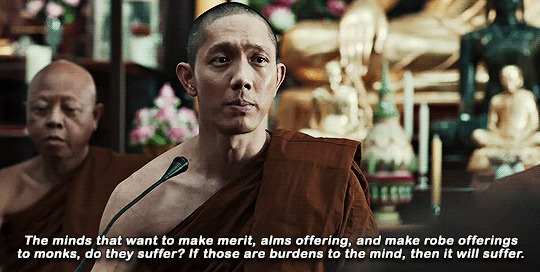
Because this Dhamma talk was probably the hardest-to-understand of all. I'll tell you why...
In this one, Monk Dol was explaining upādāna ("clinging; attachment"). However, he wasn't talking about the usual stuff about attachment like "don't be attached to money" "don't be attached to beauty" or "don't be attached to fame."
He's talking about attachment to things Buddhists think are good. Meditation. Making merits. Offering alms to monks. The rituals. He's saying that one should not even be attached to these good things. "It's easy to be attached to things that feel pleasant. But we should not be attached to them, too."
It's very counterintuitive. Buddhists are taught that all of these stuff are good and moral, so why not be attached to them?
Because if you're so stuck in doing them, it will also start to become a burden to your mind, and then it turns into suffering. But there's also more to it!
The Buddha had an analogy for this (I forgot in which sutta/sutra, though. Bruh yapped way too much and had a shit ton of sutta in the Pali Canon). Paraphrasing from my memory here:
The Dhamma is a boat. When you want to cross the river and reach the other side, you use the Dhamma (and related tools). But once you reach it and are now on land, do you still hold onto the boat? No. You discard it, having no longer need it on land. To cling to anything when it's no longer required causes dukkha.
This is what Monk Dol was also saying in that talk. Samadhi ("wisdom") during meditation is nice and pleasant, but true samadhi is knowing when to be detached from the pleasantry of meditation so that the "bliss" of it doesn't distract you from your real goal (of Enlightenment).
And this, I need to stress, was the Dhamma talk Monk Dol was giving in his first appearance. I was absolutely floored and impressed, man, because this isn't something someone with a more pop culture understanding of Buddhism can come up with. Again, fucking props to the scriptwriters and their advisors; they really know their shit!
----
Okay yea I am done rambling ahahhaha. Please, if you cook more The Believers gif set I will EAT THEM SO GOOD. I wish more people are into this shit, goddamn. And I can't wait for Season 2!!!
(You have no idea how happy I am to find a fellow appreciator like you!)
Thank you Lyn for once again blessing me with even more insights into the brilliant writing and details in the characterisation of Monk Dol (i don't deserve this. cries happy tears ಥᴗಥ. months and months of waiting and lurking in the สาธุ tag for fellow สาธุ appreciators has finally come into fruition. i truly have no regrets spending hours screencapping สาธุ. always said they were purely self-indulgent but i must admit i always secretly hope people would come across them and gave the series a chance).
I didn't think I could love Monk Dol more but you have truly proven that Monk Dol is truly in fact best flawed boi monk. In a series with such a sensitive topic, I understand that careless writing could have easily made him a terrible character or cause great controversial or mixed reactions but I do think the writing for Monk Dol was just sophisticated enough and it feels like there's much care in the crafting of his character (my beloved Dol).
Kudos to Pup who plays Monk Dol as well, because I would have never guessed that he isn't a professional actor but the frontman of a rock band (funnily enough i've been listening to Potato (his band) forever but i didn't register that they're the same person until I started watching interviews and they start asking Pup about how does it feel to transform from a rock singer to a monk).
i shall end this ask with a gif encapsulating my exact reaction of Monk Dol's first Dhamma talk/sermon
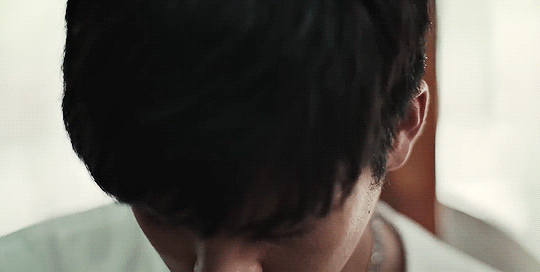
#สาธุ#the believers#Sadhu to you Claire#<-this is now your tag!#thai series#睿得失这个话痨的长篇大论#Monk Dol#Buddhism#Kafka's Buddhism hammer to all nails
6 notes
·
View notes